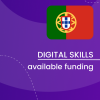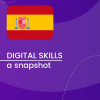Portugal: a snapshot of digital skills

Introduction
In the 2024 edition of the Digital Decade report, Portugal has achieved 56,0% basic digital skills coverage, growth comparing to 55,3% in 2023 and now surpassing the EU average of 55.6%.
According to the Digital Decade report 2024, Portugal performs slightly below the EU average in the indicator - percentage of ICT specialists in employment. With a growth from 4,3% in 2023 to 4,5% in 2024 Portugal is performing below the EU average of 4.8%.
Digital transition is one of Portugal's strategic objectives. Following the inauguration of the XXIII constitutional government on March 30, 2022, the Prime Minister appointed a new Secretary of State for digitalization and administrative modernization.
In 2022 Microsoft's Digital Futures Index measured the digitalization level of 16 European countries, including Portugal. The Index provides information on the current state of a country's digitalization and identifies both the areas where it has been most successful and those where there is still work to be done to speed up the digital transformation process. The level of digitalization is measured across five categories of digital development: Digital Business, Digital Government and Public Sector, Digital Infrastructure, Digital Sector, and Human Capital. The overall score of Portugal’s digital development is 104, which is slightly above the CEE average of 100.
Portugal’s Digital Skills and Jobs Coalition (CPED) was established in 2015 as a response to the European Commission's challenge to address the lack of digital skills in Portugal and foster greater employability in this sector. The Coalition was relaunched at the beginning of 2021. Portugal’s Digital Skills and Jobs Coalition (CPED) is a public initiative of the government, private and public entities, NGOs and academia committed to enhancing digital skills and employability of people in Portugal. To promote digital skills, INCoDe.2030 and the Foundation for science and technology developed a national Digital Skills and Jobs Platform that serves as a repository of digital training and jobs connected to the EU platform.
Overview of state strategies and national initiatives
State strategies
Digital transition is one of Portugal's strategic objectives. The Portugal Digital Mission Structure was created to be one of the key components to Portugal’s transition to a more digital, competitive, and internationally strengthened country in the context of digital transformation. The Action Plan for Digital Transition was approved on March 5, 2020, and it presents the strategy for the country’s digital transition, as laid out in the Portugal Digital Mission Structure. The Portugal Digital Mission Structure is responsible for ensuring the coordination of the Action Plan for the Digital Transition ensuring the links with the different structures involved in the measures, their implementation and the reporting of the results of the Action Plan. Action plan includes three main pillars of actions: 1. Capacity building and digital inclusion; 2. Businesses’ Digital Transformation; 3. Public Services’ Digitalization. The Action Plan for Digital Transition is coordinated by the Portugal Digital Mission Structure with the active involvement of other ministries and other public sector organizations, as well as business, academic sector, scientific community and social partners.
Additionally, National Artificial Intelligence Strategy, published in 2019, aims to promote teaching and research for innovation and development of products and services supported by AI technologies. The coordination of the Working Group and the National Strategy for Artificial Intelligence is the responsibility of INCoDe.2030.
National initiatives
Portugal’s Recovery and Resilience Plan consists of 83 investments and 32 reforms, supported by €13.9 billion in grants and €2.7 billion in loans. 38% of the plan will support climate objectives and 22% of the plan will foster the digital transition. Through RRP, significant investments and reforms are being implemented to facilitate the digital transformation. These efforts are focused on enhancing skills, digitalizing education and businesses, and modernizing the public sector, including general public administration, healthcare, the justice system, and tax administration.
The National Strategy for the Inclusion of Persons with Disabilities reform facilitates the inclusion of people with disabilities in all areas of life, promotes their autonomy, independence and self-determination and ensures equal opportunities. Specifically, it paves the way for investments to improve accessibility for people with reduced or restricted mobility to buildings, public spaces and public services (investments also covered by the Recovery and Resilience Facility), to build the digital infrastructure and enable its entry into operation to provide digital services for people with disabilities.
Portugal’s Digital Skills and Jobs Coalition, InCode2030 Programme, is a public policy initiative aimed at enhancing the digital competences of citizens and workforce in Portugal. Its primary goals are to boost digital inclusion and literacy, foster digital education and awareness of technology from an early age, empower educators with digital competences, enhance the qualifications of the current workforce, and provide specialized training for graduates in advanced digital professions.
Creative Communities for Digital Inclusion (CCDI) promote digital inclusion that addresses the requirements of individuals and communities. These communities aim to increase public awareness of the significance of digital by diagnosing the digital skills of the population and delineating various levels of proficiency. The initiative also trains technicians involved in the coordination and development as well as mentors for the digital inclusion of various vulnerable groups (students in higher education, children and youth, and other members of civil society).
The Portuguese programme "Eu Sou Digital" promotes digital inclusion by providing targeted trainings and support to individuals who have little (or no) knowledge of the internet. Subjects and topics covered include how to create and administer an email account and online correspondence, how to search online, how to consult and use digital public services, and how to access other online services such as home banking or social networking. This is accomplished by a network of 30,000 volunteers and 1,500 training centres across Portugal.
Funding opportunities
Funding opportunities for upskilling and reskilling to support the digital competences of individuals and organizations are available in the form of loans, grants, and financial instruments. For the period 2021 – 2026, most of the activities in digital transformation are financed through Recovery and Resilience facility but also as activities in Horizon, Erasmus+, ESIF and EEA grant schemes. You may find more on the page of the Portugal’s Digital Skills and Jobs Coalition and in the article on the Digital Skills and Jobs Platform.






